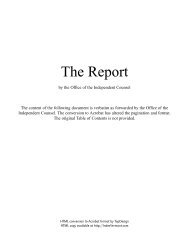THE ENTRENCHING OF INCUMBENCY_ ... - Lou Frey Institute
THE ENTRENCHING OF INCUMBENCY_ ... - Lou Frey Institute
THE ENTRENCHING OF INCUMBENCY_ ... - Lou Frey Institute
Create successful ePaper yourself
Turn your PDF publications into a flip-book with our unique Google optimized e-Paper software.
<strong>THE</strong> <strong>ENTRENCHING</strong> <strong>OF</strong> <strong>INCUMBENCY</strong>: REELECTIONS IN <strong>THE</strong> U.S. HOUSE <strong>OF</strong> REPRESENTATIVES, 1790-1994<br />
It openly distrusted those elite characters who would normally be elected to serve in government, implying that they<br />
would not necessarily retire of their own volition. Thus rotation was forced through the power of law (Wood 1969).<br />
In sum, the authors of the Constitution failed to include a provision for mandatory rotation in office because they<br />
perceived that the "best" men were no longer serving in government. New unsophisticated and ignorant politicians had,<br />
in many cases, come along to take the place of America's leading patriot families. By creating large congressional<br />
districts, the framers hoped that men would win office based not on their political connections or demagoguery, but on<br />
sterling public reputations known far and wide. Simply put, they hoped that under a new system, men like themselves<br />
would be elected. Given the public's apparent predisposition to throw gentlemen out of office, term limits seemed at<br />
least unnecessary, and at most counterproductive.<br />
While in retrospect the framers sound elitist--indeed, they were elitists--their attitude was a product of the time and<br />
place in which they lived. The world of 18th-century America, even within most republican circles, was strictly<br />
hierarchical. The best families asserted their social positions in every way possible. They lived in the nicest homes,<br />
wore elegant clothing, sat in the front pews of churches, and served in public office. Tipping their hats in deference to<br />
their community's "natural leaders," common folk generally went along with this hierarchical system. To be sure,<br />
significant social mobility existed in America, but only successful men who carried themselves as gentlemen could<br />
assume leadership in the community.<br />
The framers hoped to encourage the nation's leading men to serve in government. Naturally, the prominent men were<br />
wealthy. Wealth meant financial independence. A gentleman of means, it was believed, would be more likely to serve<br />
the needs of his community and was less tempted by the corrupting influences of money and power associated with<br />
high public office. Furthermore, it was quite natural that only those with the leisure time to read broadly could govern<br />
justly. There was no congressional staff, no think-tanks, and no bureaucracy to guide elected representatives. There<br />
were few books around by today's standards, and those that existed were expensive items. Colleges and universities<br />
stressed theology. Practical training for running a government had to come on the job, without the help of public policy<br />
experts. Given the complexity of the economic and political problems in post-revolutionary America and the diversity<br />
of local conditions throughout the 13 states, the new nation seemed to need experienced legislators.<br />
However, the framers did not favor professional politicians, whose motivations could not be disinterested. Looking<br />
back on the long struggles of English Whigs against the Stuart monarchies, American republicans understood the<br />
danger that sprang from a government class, self-serving, and distant from the people. The generation that made the<br />
American revolution, both Federalist and Anti-Federalist alike, scorned those who made their living from government.<br />
The ideal republican was embodied in Cincinnatus, a Roman farmer who put down his plow to take up arms in defense<br />
of the community. When the crisis ended, he returned to his plow. The motivation driving Cincinnatus was public<br />
virtue; not money or power, but a reputation as a virtuous citizen, was the permissible reward under a republican<br />
system of government. George Washington's behavior toward public office--his outward reluctance to hold power,<br />
climaxing in his refusal to serve a third term as President--exemplified the ideal of Cincinnatus.<br />
The political values of 18th-century republicanism faded slowly and continued to dominate electoral behavior well into<br />
the 19th century. A high turnover rate in Congress, with about one-third of its members replaced each election cycle,<br />
was precisely the rate James Harrington and his many American political heirs had called for in mandatory rotation<br />
laws. Madison did not fight very hard for term limits, probably because he knew that the sentiment at the Philadelphia<br />
Convention was against them, and the specter of entrenched incumbency was then only a theoretical menace. In the<br />
early years of the republic, Madison's hopeful speculation proved true, that a "few" members of the legislative branch<br />
would be "frequently reelected" (Madison's Notes, 21 June 1787), but "new members would always form a large<br />
Proportion" (Federalist No. 53). Concerns that Congress would become a separate, entrenched class seemed<br />
unwarranted. It appeared that no term limits law was necessary.<br />
The high turnover rate in the late 18th and early 19th centuries, as Figure 1 shows, was dependent on regular voluntary<br />
retirement from public office. Certainly the spirit of Cincinnatus, which played an important role in the political<br />
culture, encouraged such behavior. However, public service in early America was in many ways a genuine hardship.<br />
Living costs and social expectations at the capital outweighed the financial compensation for serving in Congress. Most<br />
Congressmen probably left Washington, D.C. less wealthy than when they arrived. Poor transportation, consisting<br />
http://www.cato.org/pubs/journal/cj14n3-2.html[9/13/2011 1:45:53 PM]



